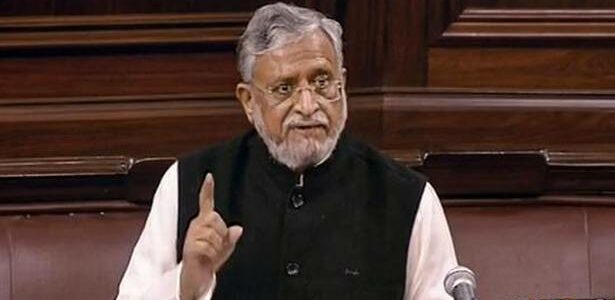
Not possible to bring petrol, diesel in GST regime even for next 8-10 yrs: Sushil Modi
Finance Minister Nirmala Sitharaman had on Tuesday said in Lok Sabha that she would be “glad” to discuss the suggestion of bringing petrol and diesel under the ambit of the Goods and Services Tax at the next meeting of the GST Council.
Bringing petrol and diesel under the GST regime is not possible for the next 8-10 years as no state is ready to face the annual revenue loss of over ₹ 2 lakh crore on this account, BJP member Sushil Kumar Modi said in Rajya Sabha on Wednesday.
Speaking in support of the Finance Bill, the former finance minister of Bihar dared the opposition to raise the matter in the GST Council, saying no chief minister or finance minister from non-NDA ruled states has opposed any decision of the GST Council.
The Centre and states collectively collect over ₹ 5 lakh crore tax on petroleum products, Mr. Modi said. The statement assumes significance in view of the outcry over the rise in petrol price for the past over one year that touched ₹ 100 per litre in some states and the demand by the Congress and some other parties that petrol and diesel be brought under the GST regime.
Finance Minister Nirmala Sitharaman had on Tuesday said in Lok Sabha that she would be "glad" to discuss the suggestion of bringing petrol and diesel under the ambit of the Goods and Services Tax at the next meeting of the GST Council.
Sushil Modi said it is easy for opposition leaders to make statements outside, but no one raises these issues within the GST Council.
"Repeatedly, the issue of putting petrol and diesel in the GST regime is being raked up. I have been associated with the GST for a long time, I want to know from the House, that if petrol and diesel are put under the GST regime, who will compensate for the loss of revenue of over ₹ 2 lakh crore to states," he asked.
"I want to tell this House that it is not possible to put petrol and diesel under the GST in the next eight to 10 years, as no state is ready to lose ₹ 2 lakh crore revenue, be it the Congress or any other government," he said.
He said the Centre and states together earn over ₹ 5 lakh crore annually from tax on petroleum products.
"People in the opposition make fun of the GST regime and someone has also said it is ‘Gabbar Singh Tax’. If you have the courage….all states have a presence there … (Congress-ruled) Chhattisgarh or Rajasthan, no chief minister or finance minister has ever opposed the GST structure.
"It is easy to make statements outside, but you need courage as displayed by Narendra Modi to implement the GST. Had there been any other prime minister, he would not have been able to implement the GST," Sushil Modi told the House.
He explained that if petroleum products are brought under the GST, 28 % tax would be collected on them as that is the highest slab in the tax regime. "Presently, 60 % tax is being collected on petroleum products. This would result in a shortfall of ₹ 2 lakh crore to 2.5 lakh crore (to both the Centre and states)," he explained in the House. "If we collect 28 % tax on petroleum products, then only ₹ 14 would be collected (per litre) against ₹ 60 at present," he pointed out. "If petrol or diesel price is ₹ 100 (per litre) then the tax component is ₹ 60 which includes ₹ 35 for Centre and ₹ 25 for respective states. Besides out of the ₹ 35 tax per litre, 42 % goes to states," Mr. Modi added. He also slammed those casting doubts on the use of revenue generated from diesel and petrol, stressing that the money is used for development activities.
"It is said that the tax collected on petrol, diesel goes into the pocket of the government. There is no separate pocket of the government. From where will the money come for providing electricity and tap water to all households. The spending of tax collection on the welfare of the country is being challenged," the BJP leader lamented.
Sushil Modi had been the convener of the GST Council in his capacity as the finance minister of Bihar for a long time.
In the first reduction in rates in over a year, petrol price on Wednesday was cut by 18 paise per litre and diesel by 17 paise per litre as international oil prices tumbled to the lowest since early February. Petrol price was cut to ₹ 90.99 per litre in Delhi from ₹ 91.17 per litre. Diesel now comes for ₹ 81.30 a litre in the national capital, down from ₹ 81.47 previously. Rates have been reduced across the country and vary from state-to-state depending on the local incidence of taxation (VAT). The prices were last reduced on March 16, 2020.
Source: Read Full Article